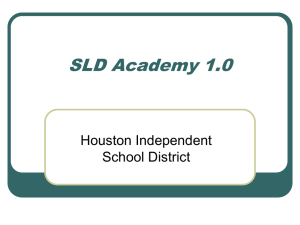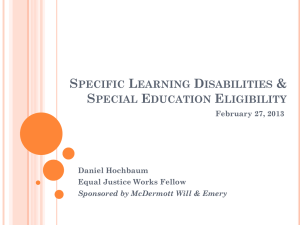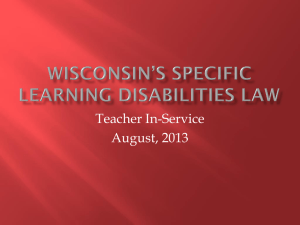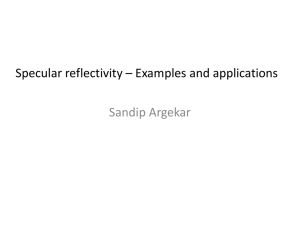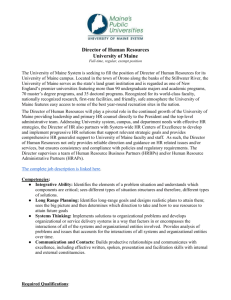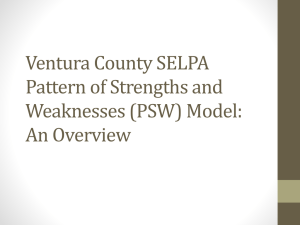Page – Buckley J. Hugo United States Department of Education
advertisement
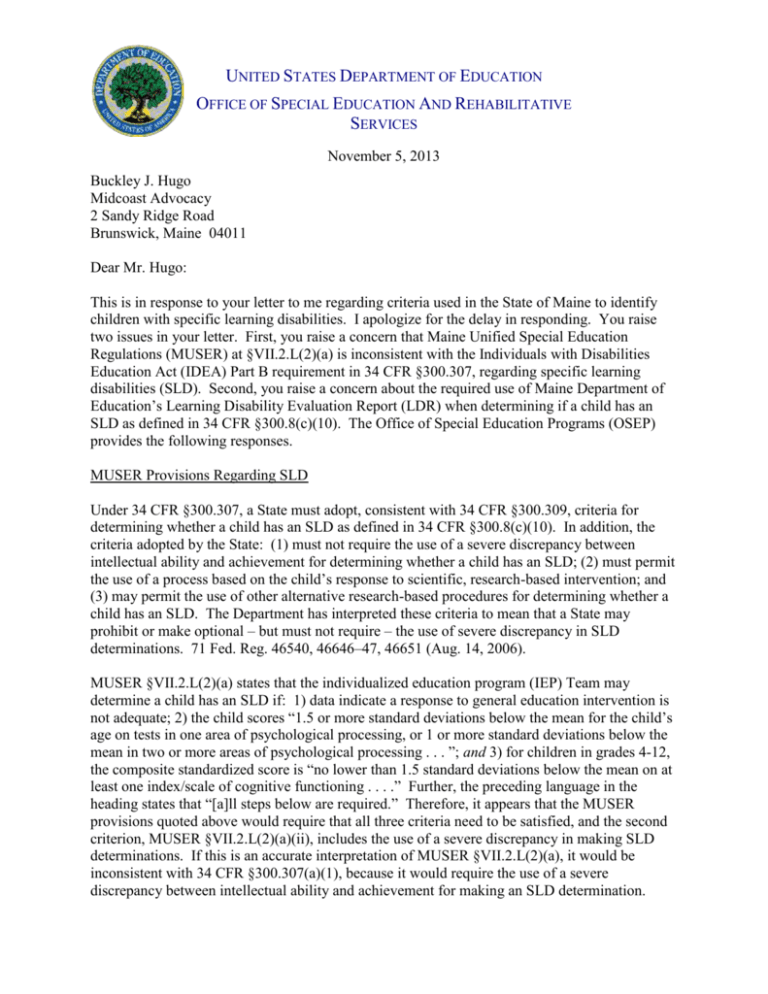
UNITED STATES DEPARTMENT OF EDUCATION OFFICE OF SPECIAL EDUCATION AND REHABILITATIVE SERVICES November 5, 2013 Buckley J. Hugo Midcoast Advocacy 2 Sandy Ridge Road Brunswick, Maine 04011 Dear Mr. Hugo: This is in response to your letter to me regarding criteria used in the State of Maine to identify children with specific learning disabilities. I apologize for the delay in responding. You raise two issues in your letter. First, you raise a concern that Maine Unified Special Education Regulations (MUSER) at §VII.2.L(2)(a) is inconsistent with the Individuals with Disabilities Education Act (IDEA) Part B requirement in 34 CFR §300.307, regarding specific learning disabilities (SLD). Second, you raise a concern about the required use of Maine Department of Education’s Learning Disability Evaluation Report (LDR) when determining if a child has an SLD as defined in 34 CFR §300.8(c)(10). The Office of Special Education Programs (OSEP) provides the following responses. MUSER Provisions Regarding SLD Under 34 CFR §300.307, a State must adopt, consistent with 34 CFR §300.309, criteria for determining whether a child has an SLD as defined in 34 CFR §300.8(c)(10). In addition, the criteria adopted by the State: (1) must not require the use of a severe discrepancy between intellectual ability and achievement for determining whether a child has an SLD; (2) must permit the use of a process based on the child’s response to scientific, research-based intervention; and (3) may permit the use of other alternative research-based procedures for determining whether a child has an SLD. The Department has interpreted these criteria to mean that a State may prohibit or make optional – but must not require – the use of severe discrepancy in SLD determinations. 71 Fed. Reg. 46540, 46646–47, 46651 (Aug. 14, 2006). MUSER §VII.2.L(2)(a) states that the individualized education program (IEP) Team may determine a child has an SLD if: 1) data indicate a response to general education intervention is not adequate; 2) the child scores “1.5 or more standard deviations below the mean for the child’s age on tests in one area of psychological processing, or 1 or more standard deviations below the mean in two or more areas of psychological processing . . . ”; and 3) for children in grades 4-12, the composite standardized score is “no lower than 1.5 standard deviations below the mean on at least one index/scale of cognitive functioning . . . .” Further, the preceding language in the heading states that “[a]ll steps below are required.” Therefore, it appears that the MUSER provisions quoted above would require that all three criteria need to be satisfied, and the second criterion, MUSER §VII.2.L(2)(a)(ii), includes the use of a severe discrepancy in making SLD determinations. If this is an accurate interpretation of MUSER §VII.2.L(2)(a), it would be inconsistent with 34 CFR §300.307(a)(1), because it would require the use of a severe discrepancy between intellectual ability and achievement for making an SLD determination. Page 2 – Buckley J. Hugo Further, this requirement appears to be inconsistent with Maine’s own regulation, in MUSER §V.2.G(1), which states that a school administrative unit “shall not be required to take into consideration whether a child has a severe discrepancy between achievement and intellectual ability in oral expression, listening comprehension, written expression, basic reading skill, reading comprehension, mathematical calculation, or mathematical reasoning.” Our concern about MUSER is reinforced by what appear in Maine’s LDR to be further inconsistencies with IDEA Part B requirements. Maine Department of Education’s LDR In conducting the evaluation of a child suspected of having an SLD, the requirements in 34 CFR §§300.304–300.311 apply. Specifically, a public agency must use a variety of assessment tools and strategies to gather relevant functional, developmental, and academic information about the child, including information provided by the parent, that may assist in determining whether the child is a child with a disability and the educational needs of the child. 34 CFR §300.304(b)(1). Additionally, a public agency must not rely on any single measure or assessment as the sole criterion for determining whether a child is a child with a disability and for determining an appropriate educational program for the child. 34 CFR §300.304(b)(2). According to Maine’s LDR, if either MUSER §VII.2.L(2)(a)(ii) or §VII.2.L(2)(a)(iii) is not met, a student does not qualify for special education as a student with an SLD. Specifically, the LDR requires an IEP Team to determine that the criterion outlined in MUSER §VII.2.L(2)(a)(ii) – i.e., that a child score 1.5 standard deviations below the mean in at least one area of psychological processing or 1 standard deviation below the mean in two or more areas of psychological processing – is satisfied in order for the child to qualify for special education as a student with an SLD as defined in 34 CFR §300.8(c)(10). The LDR also requires that the criterion in MUSER §VII.2.L(2)(a)(iii) – i.e., that a child in grades 4 through 12 obtains a composite standardized score no lower than 1.5 standard deviations below the mean on at least one index/scale of cognitive functioning – is satisfied in order for the IEP Team to determine that a child in grades 4 through 12 has an SLD. Therefore, OSEP construes the LDR as using a single assessment – here, a test of psychological processing or of cognitive functioning – as the sole criterion for determining whether a child has an SLD. If this is an accurate interpretation of the LDR, it would be inconsistent with §300.304(b) for Maine to use such a form because it could result in children with SLD not being properly identified. As a result of the concerns discussed above regarding the relevant provisions of MUSER and the LDR, OSEP has had conversations with officials of the Maine Department of Education (MDE) and will work with the Maine State Director of Special Education to resolve this matter. Based on section 607(e) of the IDEA, we are informing you that our response is provided as informal guidance and is not legally binding, but represents an interpretation by the U.S. Department of Education of the IDEA in the context of the specific facts presented. Page 3 – Buckley J. Hugo Thank you for bringing this matter to our attention. If you have questions, please do not hesitate to contact Jennifer Wolfsheimer at 202-245-6090 or by email at Jennifer.Wolfsheimer@ed.gov. Sincerely, Melody Musgrove, Ed.D Director Office of Special Education Programs cc: State Director of Special Education
